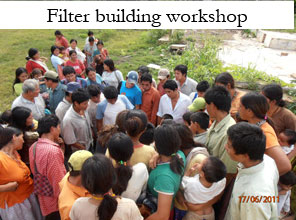Recent News
UNM Engineering team wins ASEE best paper for work on first-year engineering course
July 17, 2025
New director will enhance interdisciplinary engineering learning opportunities
July 2, 2025
Final SIRI cohort visits UNM campus
June 30, 2025
Perfetti receives ANS Landis Engineering Achievement Award
June 26, 2025
News Archives
UNM Student Chapter of Engineers without Borders Develops Sustainable Solutions to Drinking Water Treatment in Bolivian Villages
July 26, 2011
It was really tough — and they want to do it again. In June, 9 members of UNM’s Engineers Without Borders (EWB) chapter, including current and recent UNM students, practicing engineers and faculty members spent two and a half weeks in two small Bolivian villages in the Amazon jungle working to improve their access to clean drinking water using appropriate, sustainable technologies.
 The EWB team built household-scale slow sand filters, a low-tech solution to removing disease-causing bacteria, in the Tsimane villages of Tacuaral and Campo Bello, Boliva. The Tsimane are an indigenous group in the Bolivian Amazon basin, who speak their own language and who survive largely by subsistence farming and hunting. Today many of the families in these villages draw drinking water from the local river, lagoons, and hand-dug wells. With sustainability a central goal, inexpensive, local materials were used for filter construction. The students also conducted hygiene and filter building.
The EWB team built household-scale slow sand filters, a low-tech solution to removing disease-causing bacteria, in the Tsimane villages of Tacuaral and Campo Bello, Boliva. The Tsimane are an indigenous group in the Bolivian Amazon basin, who speak their own language and who survive largely by subsistence farming and hunting. Today many of the families in these villages draw drinking water from the local river, lagoons, and hand-dug wells. With sustainability a central goal, inexpensive, local materials were used for filter construction. The students also conducted hygiene and filter building.
Andrew Schuler, associate professor of Civil Engineering traveled with the group this year. “It was a great experience camping in the villages and working with the locals,” he said. “They were very motivated, as they understood that poor drinking water was leading to sickness in their communities. A home run for this project would be if they build and maintained more sand filter systems during the next year and we could then expand the project to more families and villages. However, this is the beginning of a long-term relationship with the Tsimane people, and should there be technical, societal or economic barriers to their use, we can make modifications or try other approaches.”
Kacey Cubine, Sara Eatman, David Forster, Amanda Green, Kelly Isaacson, Justin Jayne, Ryan Schnalzer and Kent Steinhaus also joined the trip.
See a slideshow
UNM already has a year-round presence in the Tsimane community – Professor Hilliard Kaplan in the UNM Department of Anthropology is director of the Tsimane Health and Life History Project – which should help with monitoring the filter systems and communications with the communities. The filtration systems are a pilot project and students from UNM will return next summer to measure progress and build more systems.
Several groups helped sponsor the EWB trip to Bolivia including Associated Students of the University of New Mexico (ASUNM), the UNM Graduate and Professional Students Association, UNM College of Engineering, NM Society of Professional Engineers, NM Air and Waste Management Society, Burnett Engineering and Daniel B. Stephens & Associates.
Media contact: Karen Wentworth (505) 277‑5627; kwent2@unm.edu
